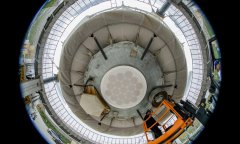CHICAGO, Dec. 8 (Xinhua) -- A new wastewater testing approach developed by researchers at the University of Michigan (UM) and Stanford University not only detects the virus in wastewater samples but also tracks whether the infection rates are trending up or down.
The researchers sought to advance the effectiveness and accuracy of wastewater surveillance for COVID-19 by comparing the ability to detect the virus in two kinds of samples: the mostly liquid influent coming into wastewater treatment facilities, and the solid sediment that settles in the facilities' tanks. They found the settled solid samples had higher concentrations and better detection of SARS-CoV-2, the virus that causes COVID-19, compared to the liquid versions.
The researchers then tested about 100 settled solid samples from the San Jose-Santa Clara Regional Wastewater Facility from mid-March to mid-July 2020, tallying daily concentration numbers. Using statistical modeling they compared these concentrations with COVID-19 confirmed cases provided by the county. Their results tracked the trend of the county's cases, decreasing in both May and June and peaking in July.
The research presents a possible way to identify new outbreaks, find hotspots, confirm the decrease of cases and inform public health interventions. As schools reopen, the technology could be implemented by districts to identify whether community virus circulation is decreasing. It also has the potential to be used in areas lacking the resources for robust individual clinical testing, such as testing sites in Illinois that reportedly closed early after running out of tests.
There are still pieces of information needed to better understand the limitations of wastewater testing and improve what can be gleaned, the researchers note. The virus's rate of decay in wastewater, the extent and timeline of viral RNA shedding when sick and varying operations of different wastewater plants all have the potential to impact results. Future studies on these factors could lead to better insights about case trends.
The research team is launching a new pilot this month to sample up to eight wastewater treatment plants within California daily, with a 24-hour turnaround time. The pilot aims to better understand what types of almost real-time data are useful to public health officials.
Implementing the methods and framework developed by the team and pilot study could also be used in the future to monitor wastewater for pathogens beyond COVID-19 circulating within communities.
The study, posted on UM's website on Monday, has been published in Environmental Science &Technology.








